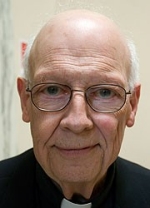Lawrence Dewan, O.P.

North Bay, Ontario, Canada, 22 March 1932 - Ottawa, Canada, 12 February 2015
Priestly ordination: Entered the Dominican Order in 1972 and ordained priest in 1976
Appointment to the Academy: 16 December 1999
Scientific discipline: Metaphysics
Academic title: Professor
Most important awards, prizes and academies
President, American Catholic Philosophical Association (1992-1993); President, Canadian “Jacques Maritain” Association (1988-1995); Member, Canadian Philosophical Association; Member, Society of Christian Philosophers; Visiting Professor of the Metaphysics of St. Thomas, Pontifical Institute of Mediaeval Studies, Toronto (1983-1989); Visiting Professor of Philosophy (Metaphysics of St. Thomas), Catholic University of America, Washington, D.C. (1990-1997); Master of Sacred Theology (O.P.), 1998.
Summary of scientific research
My interest from the beginning has been in the nature of being. The approach (following my teacher, Etienne Gilson) has been historical, focusing primarily on St. Thomas. I wrote a doctoral dissertation in Toronto on the doctrine of being of Johannes Capreolus. Subsequent studies have concentrated on the ineluctable contribution of form and essence for an adequate conception of being. I have also stressed the validity of Thomas’s assessment of Aristotle as a source of metaphysical insight, including Thomas’s attribution to Aristotle of a doctrine of creation; rejection of this view stems from a conception of being which remains somewhat on the level of physics. However, metaphysical interests lead to studies concerning the nature of knowledge and the foundations of morals. I have also been active in these areas.
Academic background
B.A. (Honours), Toronto (1953); M.A. (Philosophy), Toronto (1955); Ph.D. (Philosophy), Toronto 1967; B.A. (Theology), Dominican College (1974); M.A. (Theology) 1976.
Main Publications
Number and Order of St: Thomas’s Five Ways, Downside Review 92 (1974), 1-18; St. Thomas, Capreolus, and Entitative Composition, Divus Thomas 80 (1977), 355-375; Being per se, Being per accidents, and St. Thomas’ Metaphysics, Science et Esprit 30 (1978), 169-184; St. Thomas and the Causality of God’s Goodness, Laval théologique et philosophique 34 (1978), 291-304; St. Thomas and the Possibles, New Scholasticism 53 (1979), 392-404; St. Thomas, Ideas, and Immediate Knowledge, Dialogue 18 (1979), 392-404; St. Thomas and the Divine Names, Science et Esprit 32 (1980), 19-33; Distinctiveness of St. Thomas’ Third Way, Dialogue 19 (1980), 201-218; St. Thomas, Metaphysics, and Formal Causality, Laval Théologique et philosophique 36 (1980), 285-316; Real Distinction between Intellect and Will, Angelicum 57 (1980), 557-593; St. Thomas and the Ground of Metaphysics, in Philosophical Knowledge, edited by John B. Brough, Daniel O. Dahlstrom, and Henry B. Veatch (Proceedings of the American Catholic Philosophical Association, vol. 54), Washington, DC, 1980: ACPA, 144-154; Obiectum: Notes on the Invention of a Word, Archives d’histoire doctrinale et littéraire du moyen âge 48 (1981), 37-96; St. Thomas, Joseph Owens, and Existence, New Scholasticism 56 (1982), 399-441; St. Thomas Aquinas against Metaphysical Materialism, in Atti dell’VIII Congresso Tomistico Internazionale, t.V, 412-434, Vatican City, 1982: Libreria Editrice Vaticana; St. Albert, Creation, and the Philosophers, Laval théologique et philosophique 40 (1984), 295-307; St. Thomas, Joseph Owens, and the Real Distinction between Being and Essence, The Modern Schoolman 61 (1984), 145-156; St. Thomas and the Principle of Causality, in Jacques Maritain: philosophe dans la cité / A Philosopher in the World, ed. J.-L. Allard, Ottawa, 1985: University of Ottawa Press, 53-71; Jacques Maritain and the Philosophy of Co-operation, in Alterité. Vivre ensemble differents, ed. M. Gourgues and G.-D. Mailhiot, Montréal and Paris, 1986: Bellarmin/Cerf, 109-117; St. Thomas, Our Natural Lights, and the Moral Order, Maritain Studies/Etudes maritainiennes (Ottawa) 2 (1986), 59-92 [reprinted in Angelicum 67 (1990), 285-307]; Something Rather than Nothing, and St. Thomas’ Third Way, Science et Esprit 39 (1987), 71-80; Laurence Foss and the Existence of Substances, Laval théologique et philosophique 44 (1988), 77-84; Death in the Setting of Divine Wisdom, Angelicum 65 (1988), 117-129; Communion with the Tradition. For the Believer who is a Philosopher, in: Science et Esprit 40 (1988), 315-325; Saint Thomas, Alvin Plantinga, and the Divine Simplicity, The Modern Schoolman 66 (1989), 141-151; Saint Thomas, Metaphysical Procedure, and the Formal Cause, The New Scholasticism 63 (1989), 173-182; Saint Thomas, Form and Incorruptibility, in Jean-Louis Allard (ed.), Etre et Savoir (Philosophica 37), Ottawa, 1989: Les Presses de l’Université d’Ottawa, 77-90; The Interpretation of St. Thomas’s Third Way, in: Littera, sensus sententia, Studi in onore del Prof. Clemente J. Vansteenkiste, O.P. (edited by A. Lobato, O.P.), Milan, 1991: Massimo; St. Thomas, Aristotle, and Creation, in Dionysius (annual of the Classics Dept., Dalhouse U., Halifax, N.S.) 15 (1991), 81-90; Truth and Happiness [Presidential Address to the American Catholic Philosophical Association], American Catholic Philosophical Quarterly 67 (1993) [Annual Supplement: ACPA Proceedings], 1-21; Thomas Aquinas, Creation, and Two Historians, Laval Théologique et philosophique 50 (1994), 363-387; St. Thomas, the Fourth Way, and Creation, The Thomist 59 (1995), 371-378; St. Thomas’s Successive Discussions of the Nature of Truth, in Daniel Ols, O.P. (ed.), Sanctus Thomas de Aquino: Doctor Hodiernae Humanitatis (Miscellanea offerta... al Prof. Abelardo Lobato, O.P.), Vatican City, 1995: Libreria Editrice Vaticana; Capreolus, saint Thomas et l’être, in Jean Caprelous et son temps 1380-1444 Colloque de Rodez [special number, #1 of Mémoire dominicaine], Paris, 1977: Cerf, 77-86; Jacques Maritain, St. Thomas, and the Birth of Metaphysics, Etudes Maritainiennes/Maritain Studies 13 (1997), 3-18; St. Thomas, Lying, and Venial Sin, The Thomist 61 (1997), 279-299; St. Thomas, Physics, and the Principle of Metaphysics, in The Thomist 61 (1997), 549-566; St. Thomas and Creation: Does God Create ‘Reality’?, in Science et Esprit 51 (1999), 5-25; St. Thomas and the Distinction between Form and Esse in Caused Things, Gregorianum 80 (1999), 353-370; The Individual as a Mode of Being According to Thomas Aquinas, The Thomist 63 (1999), 403-424; Etienne Gilson and the Actus essendi, Maritain Studies/Etudes Maritainnienes 15 (1999), 70-96; St. Thomas and the Existence of God: Owens vs. Gilson, and Beyond, in God and Argument, ed. William Sweet, Ottawa, 1999: University of Ottawa Press, 115-141.



